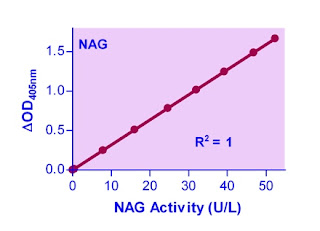Acetylcholinesterase Assay Kit
ACETYLCHOLINESTERASE (EC 3.1.1.7, AChE), also known as RBC
cholinesterase, is found primarily in the blood and neural synapses. Low serum
cholinesterase activity may relate to exposure to insecticides or to one of a
number of variant genotypes. AChE catalyzes the hydrolysis of the
neurotransmitter acetylcholine into choline and acetic acid, a reaction
necessary to allow a cholinergic neuron to return to its resting state after
activation. Cholinesterase levels of cells and plasma are used as a guide in
establishing safety precautions relative to exposure and contact, as well as a
guide in determining the need for workers to be removed from areas of contact with
the organic phosphate insecticides. Simple, direct and automation-ready
procedures for measuring AChE activity are very desirable. BioAssay Systems
QuantiChrom™ Acetylcholinesterase Assay is based on an improved Ellman
method,in which thiocholine produced by the action of acetylcholinesterase
forms a yellow color with 5,5’-dithiobis(2-nitrobenzoic acid). The intensity of
the product color, measured at 412 nm, is proportionate to the enzyme activity
in the sample.




Acetylcholinesterase, also known as AChE or acetylhydrolase, is a hydrolase that hydrolyzes the neurotransmitter acetylcholine. AChE is found at mainly neuromuscular junctions and cholinergic brain synapses, acetylcholinesterase
ReplyDelete